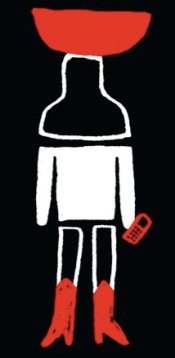My Kenyadian Experience – Part 2

Muoi performs for other production members in a workshop held at the Elgin Theatre in February 2010. Photo by Amanda Lynne Ballard.
This is part 2 of 3 of My Kenyadian Experience by Muoi Nene.
Muoi is an actor in Glo and Shine Your Eye who has been an active contributor to both development processes. Click here to read part 1.
Glo
Kibera is an informal settlement in Nairobi – the capital of Kenya – that was apparently created by the British to host Nubian soldiers from Sudan who fought among their ranks in the First World War. Through a number of political missteps, as well as corruption and mismanagement, one century later the settlement has grown into Africa’s 2nd largest urban slum and one of the largest in the world. More can be said about this dynamic, energetic, entrepreneurial, previously officially ignored but otherwise central and essential organ in the massive body of humanity that is Nairobi. I will, however, leave the reader the opportunity to research on their own; this article is about The Africa Trilogy and one of its three plays, Glo, and it should not be tarnished by local Nairobi politics.
Auditioning for the part of Hyde, a young gang leader from Kibera, was a dream for me because on top of fearing the likes of Hyde while growing up, I hoped for their extermination. The aforementioned political missteps, corruption, and mismanagement forced them to prey on the likes of my family in the desperation that is Kibera. This role has given me the opportunity and indeed the responsibility to become one with Kibera and Hyde–a beautiful parallel thanks to the abundantly gifted writer, Christina Anderson. A successful audition later, I met Volcano’s group of professionals at work. In them I found a group that is focused on getting it right. The goal is so clear to all and those who are not clear are keen to play a constructive role to the point that the whole experience was such a blessing for all and a freeing revelation for me. The first thing I did with my freedom in the development of Glo was to inject Nairobi’s native tongue, Sheng’, into the script as guided by our director Josette Bushell-Mingo.
Josette’s résumé needs a movie trilogy of Cameron, Jackson, or Lucas proportions just to introduce it, so I should not attempt to put it in words here. But if I dared use a word, the adjective I would use to describe Josette as a director would likely be the product if awesome and great had a baby. Josette is an amazing woman whom I quickly came to respect and appreciate as a strong, funny, warm, firm, thoughtful, talented, accommodating professional; this is before I found out that she is one of the most respected directors across at least two continents and one who has been awarded the Order of the British Empire. Josette is clear on what the tasks are for the project and is perfectly positioned to facilitate the creative process from the writing to the eventual performance of Glo.
Through the process of developing Hyde for The Africa Trilogy, I discovered that the boys and girls who lived in the slums were not much different from me. In the past, like many in my middle-class Nairobi existence, I didn’t really think about it. We just watched our baseball caps and cheap jewellery while walking by them in the streets. Most of these youngsters probably didn’t have a parent who squeezed passion and orange juice in our tourist-rich hotels as my mum did for her small business. Seeing me, a twelve-year-old walking around with merchandise, I expect they wanted to squeeze my neck til I let go of my wallet. I also remembered that my school experience from primary school to high school was in fact a microcosm of what was going on in the country. We shared dormitories with kleptomaniacs in the boarding schools just like our parents did in some government offices. There were oppressive prefects in the halls, be they dining halls, class halls, or dormitory halls, and they weren’t always students but also teachers with aiming to climb the “corporate ladder” on the back of “averted danger” in the form of excessive punishment for minor infractions. Kenyan police officers have sometimes been put in impossible positions where they cannot stop characters with such oppressive tendencies from rising to power. These perpetrators, who were often themselves police officers, can then sit safely in their government offices ordering crime.
The aforementioned evils are propagated by the Africans now but their roots are definitely in the West, mostly the legacy of the Europeans who left the colonies with our wealth but now, more and more in the U.S. where the real world economic and political power is housed. Nairobi’s strategic position makes it the preferred location to form a base for anyone looking to take on the region’s manychallenges, from war to piracy, famine, drought, disease, and even the environment.UNEP head offices are based in Nairobi. Not to be left behind, Al Qaeda took a shot at their arch nemesis by killing over 250 Kenyans in a U.S. embassy bombing in 1998. I boarded a matatu – Nairobi’s unique public transport minivans – less than 30 mins earlier approximately 100 metres from the blast. It is easy to see how Nairobi’s geo-political importance gives Nairobians of all walks of life quite a perspective on the relationship between Africa and the West. Hyde is after all a young man in the biggest, wealthiest, most corrupt, most energetic, most dangerous city in greater East Africa, with the exception of countries with active military conflict. He will know a thing or two about the West and what it has in store for Africans.
As may be evident from this article, the level of personal excavation this role allowed me is difficult to exaggerate. I will not, however, be doing this project justice if I fail to express that it has accessed the most genuine part of a young Nairobian and given it voice. As the headquarters for many important agencies including UNEP, Nairobi is also the NGO capital for the region. Any Nairobian would kill to work in a UN office, if not another multinational multimillion-dollar multilingual multiagency organization. Nairobians are the quintessential workaholics and, sadly, also boast in their ranks an unhealthy number of alcoholics. The singing staggering alcoholics make easy prey for Hyde and his compatriots as they “squeeze,” (or ngeta as we call the neck choke) to effectively relieve their victims of their meagre possessions.
Another thing that Nairobi is not short of is strong women. They are in the market hustling with the men. The stereotype of the tough African market woman is definitely reinforced in the many markets and city streets where the women wrestle and play cat-and-mouse with the city council enforcement officers. I remember about 4 p.m., as the city started to free her worker bees from their hives in the aging concrete blocks along the narrow century-old streets, the women would line the streets with their wares: fresh fruits and vegetables; second-hand shirts, blouses, shoes, or toys according to the season; and of course, second-hand books. In other words, a department store would open up on Nairobi’s streets, andaisle clean-up meant the city council officers pouring down to arrest the businessmen and women– unless, of course, they were willing to part with some “tea” or “something small – Kitu Kidogo.” This is the dirty laundry that perpetuates the slums and the living conditions of the people there. The dog-eat-dog mentality has forced the average Nairobian, especially Nairobi girl, to become a tough, relentless force that won’t stop until the job is done and the shilling made.
Glo is in fact a tale about the experiences of a set of Nairobians, one of whom gets to visit another most powerful city in its region, New York. It is a sight to behold and a must-see for all Africans in the Diaspora as well as any true thinkers on the issues around Africa and her interaction or relationship with the West. One has to see the play next summer at the Luminato Festival at Harbourfront in Toronto to appreciate the artistry as skilfully scripted and carefully choreographed by Christina and Josette respectively.




















